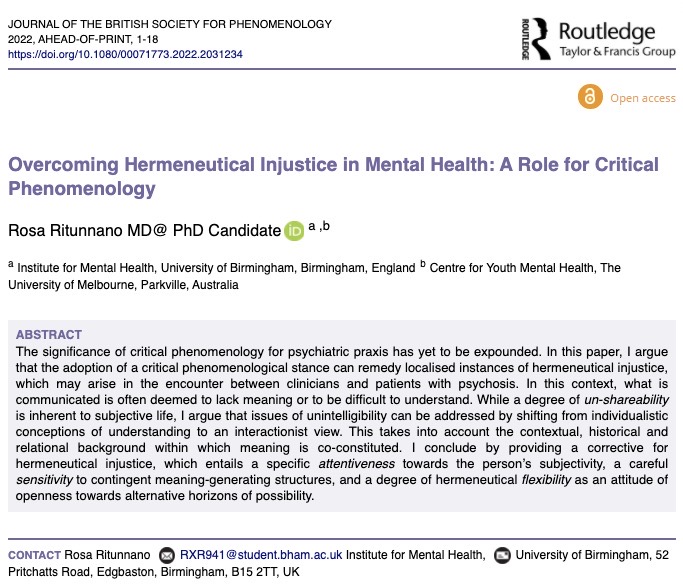
I know it’s a different Twitter this year, but for those who are still around, I have made a short ‘2022 year in review’ 🧵to keep the tradition going. Only #OpenAccess 🔓 papers published in 2022. From a forthcoming Editorial to the start of the year, it’s been a busy 2022! 1/10
🔜 in Epidemiology and Psychiatric Sciences: we reflect on current methodological trends in psychiatry and aim to build a bridge between two fields that are frequently siloed off from each other— interventional research and phenomenologically-informed research.⏱️this space! 2/10
In Philosophical Psychology, appealing to “position-taking” we understand ‘symptom’ formation in psychosis as a dialectic between anomalous self/world experiences and the person’s efforts at adapting to the ensuing existential challenges.
doi.org/10.1080/095150… 3/10
doi.org/10.1080/095150… 3/10
Previously, in @TheLancetPsych, we reviewed all the available qual literature that explored the experience of delusions in psychosis and conducted a thematic synthesis to develop a new theoretical framework grounded in lived experience.
doi.org/10.1016/S2215-… 4/10
doi.org/10.1016/S2215-… 4/10
We found that delusions often involve a radical rearrangement of the lived world dominated by intense emotions, that they are embedded within complex and dynamic processes of intrapersonal and interpersonal identity negotiation and self-constitution, 5/10 

and that they are often driven by both individual and intersubjective processes of meaning-making, expressive of a fundamental human need to find coherence and meaning beyond a simple dysfunction framework.
Blog post here 👇imperfectcognitions.blogspot.com/2022/11/subjec… 6/10
Blog post here 👇imperfectcognitions.blogspot.com/2022/11/subjec… 6/10

My essay “Overcoming Hermeneutical Injustice in Mental Health: A Role for Critical Phenomenology” winner of the 2021 Wolfe Mays essay prize was published in the Journal of the British Society for Phenomenology doi.org/10.1080/000717… 7/10
And two (2021-online-first) papers were also published:
Ritunnano, R., Humpston, C., & Broome, M. R. (2022). Finding order within the disorder: a case study exploring the meaningfulness of delusions. BJPsych bulletin, 46(2), 109-115
doi.org/10.1192/bjb.20… 8/10
Ritunnano, R., Humpston, C., & Broome, M. R. (2022). Finding order within the disorder: a case study exploring the meaningfulness of delusions. BJPsych bulletin, 46(2), 109-115
doi.org/10.1192/bjb.20… 8/10
And Ritunnano, R., & Bortolotti, L. (2022). Do delusions have and give meaning? @lisabortolotti
doi.org/10.1007/s11097… 9/10
doi.org/10.1007/s11097… 9/10
A lot planned already for 2023, kicking off with a mixed-methods empirical investigation of delusions combining phenomenology and linguistics and exploring the roles of #subjectivity, #narrative and #metaphor in the emergence of delusional phenomena in psychosis. 10/10
See you on the other side, here (still hoping) or somewhere else! Happy Holidays 🎄🎄🎄! @IMH_UoB @matthewrbroome /END 

cc: @JeannetteL16
• • •
Missing some Tweet in this thread? You can try to
force a refresh






